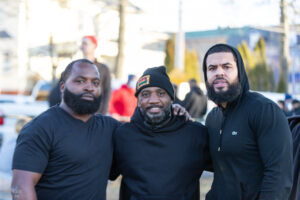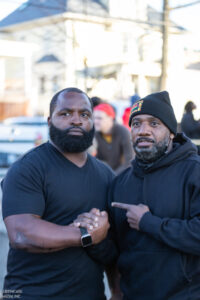
Dewayne “Boo” Hackney is a legendary community organizer, barber, father, husband, brother, musician, and so much more. His commitment to justice especially here in Providence cements his legacy as one of our City’s most Beloved Community heroes.
This piece is dedicated to my brother, Bucky. He paid the price of allowing me to do this work without complaining about not having time with me.
To my I.O.U. brothers: Gerard Catala, Pastor Sherrod Jones, Pastor Rah’D, Dennis Lassiter, Ray Watson aka Two Hawks, Brother Arthur Johnson, Brother Everett Muhammad, Brother Osiris Harrell, Brother Ray Smith, Terrell Osborne Jr. aka DJ Spin, Sterling Mousey Washington. And last, but certainly first, to my wife Kia Clement Hackney. I am incapable of adequately expressing the significance of your role.
Anjel Newmann (Motif): Who do you hail from?
Dewayne “Boo” Hackney: My roots are in Mississippi and Virginia. My dad is J.C. Thomas. My mother is Gloyce Hackney. They raised me as royalty and that started to permeate through the city, through the people. Everybody around me raised me. And I don’t mean “raised” me like my parents. I mean, they held me up. Kept me up. That gave me very few opportunities to fall off or be less than what I was supposed to be. There are places in PVD that we consider the “eyesores” of our city: in front of Dunkin’ on Broad Street; Central High School; McDonald’s. The people hanging outside those establishments have a history, a legacy, and played a role in protecting me. I have so many surrogate uncles that lived “that life.” A lot of my friends were some of the biggest hustlers, victims, and victimizers. I was in it, but never in it. Never smoking, never hustling, so when it came to me understanding my influence, I’m like, “I owe you.” I owe you a better and more powerful influence. Those letters (IOU) turned into, “IT’S ON US” because I want that culture to exist. I want us to be held accountable. I want us to not only take accountability, but for us not to look outside of ourselves for our solution and our salvation.
AN: What is It’s Hair?
DH: It’s Hair barbershop was always a space for everybody. We had priceless conversations there. My brother, Mike Hoston (rest in power) and I were co-owners. In many ways, It’s Hair was an extension of the Southside Boys and Girls Club. The ethics and etiquette that came out of that building came from Mr. Roosevelt “Bells” Benton, Ms. Beatrice, and all the other staff members. Ms. Doreen Dennis, we called “Auntie Dor,” and the rest of em, Kyle and Kobi Dennis came from there, Shawndell Burney-Speaks. All of us came from there. That’s what I hail from as well.
When our barbershop was on Broad Street next to Tony’s Meat Market, we had a sign that said, “No niggas in here, just brothers. “We drew the line on the term and how we would address one another. So we were either “mister” or “brother,” you know what I mean? And we weren’t elevating ourselves like we are “mister” because we’re older than you – we’re all “mister” because we are somebody and we’re going to put respectful titles on ourselves. We had mentees in there from high schools and middle schools that we would call “Mr.” whatever. Everybody was Mr. and Mrs. It became a way of life. We set the tone with “Peace.” That’s not a “hip-hop” term. That’s greetings. Like, we’re opening up with peace.
I also hail from Minister Farrakhan, The Autobiography of Malcolm X. All of that was in the barbershop. Farrakhan said the names Muslim, Christian, and Jew were just labels that separate the family of God and I saw the names South Side, East Side, and Chad Brown as labels that separated the families of Providence. That understanding allowed me to connect with my Christian family. It allowed me to put a group of accountability partners together – myself, Mr. Kev McNeil, Mr. Kev Saunder, Mr. Joey Gomez, Bold Island Troopers – using Its Hair as the home base.
I’ve given young men their first haircut and if, unfortunately, they get murdered at 18, their family asks me to give them their last haircut at the funeral parlor. Nine times outta 10, I’ve been cutting the person who killed them as well. So I have like a 20-year relationship with these young men on both sides of the gun. We used It’s Hair as a mediation center. We stopped a lot of murders. We’d have brothers who had murder beef, and we would set up a date to bring those guys there. Its Hair was the safe haven. Guys would leave their weapons outside. Sometimes we had to take drastic measures to the point where we would suspend a whole crew or a whole block. We lost a lot of money just off of responsible suspensions, but we saved a lot of lives.
AN: What was it like to move on to that next phase of your life?
DH: I ran into a brother yesterday, whom I haven’t seen in 10 years. He was like, “I’m angry with you.” I’m like, “What’s the matter?” He said, “You closed the barbershop. You guys were the Black Pillar. You left us.” But like Deion Sanders said, “I left the Black school. I didn’t leave Black people.” I had a strategic second phase of my life orchestrated. As a people, we are in such despair that any symbol of hope, we latch onto it and we hold it sacred. We think that the symbol is ours. That’s why we get so emotional when that symbol transitions when that symbol is called to do other things or more on different levels. As that “symbol,” it’s painful to be restricted when you’re supposed to be doing so much.

I never disconnected from my people. I wanted to be a symbol of freedom. I wanted to show everybody you can just bust a move and jump in another lane. I even went to grief counseling as part of this move. I needed a break from the 24-hour access, open-door policy. Someone could just come through the shop and be like, “Yo, my son just got shot,” or, “The cops just beat up my nephew.” Never ever tired of that work but also telling myself 20 years ago, “I’m too valuable to be unorganized.” Transitioning was about playing fair with my family. They submitted and supported all throughout my journey. They weren’t gonna ask me to stop. So I needed to be the man, make the move, and acquiesce to their interests.
When my daughter was 11, I said, “I’m gonna turn my phone off for two weeks and just be with the family.” She said, “Dad, if MLK turned his phone off, you think we’d be where we’re at right now?” I said, “Damn. She understands.” But she didn’t understand the cost that she and her brother were gonna pay. Dad might not be home at 3AM cause he might be running to the emergency room. He might be with the Nation of Islam taking shooters to DC, which we did. Southside and East Side crews. Took them to DC for the anniversary of the Million Man March. Rival members sharing seats with each other.
People also didn’t understand my paranoia. Nipsey was literally dedicated to his hood when he was killed in front of his business. People were inboxing me like, “Mr. Boo, I know that would never happen to you. The hood got too much love for you.” They don’t know that I never slept on the possibility. Maybe it’s PTSD – in this case, PRE-traumatic stress disorder; like the anticipation, because of the environment that we’re in. I would always look both ways when I came out of the barbershop. I don’t park my car nose in. All of these things were necessary steps for me to make the transition to what I’m doing right now.
AN: What are your future hopes for our Beloved Community here in Providence?
DH: I hope we end up in a better place, not heaven, but heaven on Earth. As we create and contribute to the hell on Earth, create and contribute to heaven on Earth, on a tangible, visible level. Some of the stuff I’ve been working on are the aesthetics of the city, inclusive neighborhoods, for example, the red, black, and green stripes on Ms. Rosa Parks Boulevard. We have to start seeing ourselves. You never know what’s going to turn on the “Malcolm” in you. The “Serena” in you. The extra extraordinary in you.
I definitely wanna see policy change, but we have to be a part of it. We’ve been beaten down so much, that we’ve perfected the art of complaining about organizations from the outside, so that’s why I chose to join the board of directors of the Nonviolence Institute and the NAACP, and do some things on a city level like being a member of the African American Ambassadors group. I’ve always had a super active relationship with my council people, cause I understand that they’re really the president of your daily life.
I also hope that we always remain hopeful. Never fold. And we don’t. It’s not in our DNA. I have so many pillars of my thinking. Lil Wayne said, “This is my theme park, so what should I scream for?” Like, I own this. I gotta have that mindset. I come from God. I hail from God. Nas says, “As long as I’m breathing, I’m winning.” Jay-Z says, “Never let ‘em see you frown, even smile when you’re down.” Denzel in Training Day; when it was all said and done, was found to be a dirty cop. Lost all the money. His cover – blown. All shot up. Car flipped over 30, 40 times. Dying… and he’s patting his chest, patting his body – and it looks like he’s counting how many times he’s been shot, but he’s only looking for his lighter. He burns a cigarette like, “Shit! I’m winning anyway, I can’t lose.” These are the pillars of my thinking. I can’t lose. I literally can’t lose. So it’s just that type of thing. Us knowing who we are. I hope we know who we are, you know what I mean?
Find Dewayne Boo Hackney online:
Instagram: @dewayneboohackney
Facebook: Dewayne Boo Hackney



